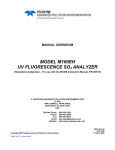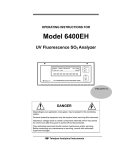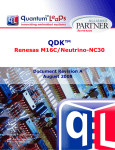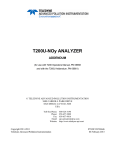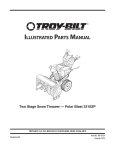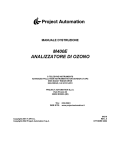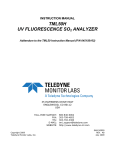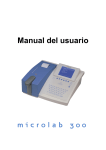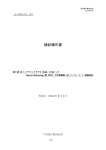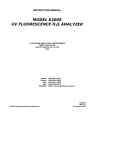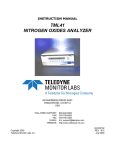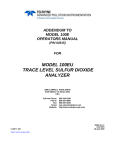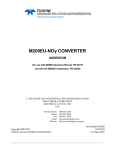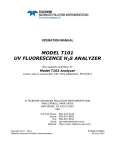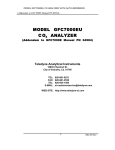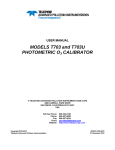Download Teledyne t100h User's Manual
Transcript
MODEL T100H UV FLUORESCENCE SO2 ANALYZER Addendum to T100 Operation Manual, PN 06807 © TELEDYNE ADVANCED POLLUTION INSTRUMENTATION 9480 CARROLL PARK DRIVE SAN DIEGO, CA 92121-5201 USA Toll-free Phone: Phone: Fax: Email: Website: Copyright 2011 Teledyne Advanced Pollution Instrumentation 800-324-5190 858-657-9800 858-657-9816 [email protected] http://www.teledyne-api.com/ PN 07265A DCN6038 25 March 2011 SAFETY MESSAGES Important safety messages are provided throughout this manual for the purpose of avoiding personal injury or instrument damage. Please read these messages carefully. Each safety message is associated with a safety alert symbol, and are placed throughout this manual; the safety symbols are also located inside the instrument. It is imperative that you pay close attention to these messages, the descriptions of which are as follows: WARNING: Electrical Shock Hazard HAZARD: Strong oxidizer GENERAL WARNING/CAUTION: Read the accompanying message for specific information. CAUTION: Hot Surface Warning Do Not Touch: Touching some parts of the instrument without protection or proper tools could result in damage to the part(s) and/or the instrument. Technician Symbol: All operations marked with this symbol are to be performed by qualified maintenance personnel only. Electrical Ground: This symbol inside the instrument marks the central safety grounding point for the instrument. CAUTION This instrument should only be used for the purpose and in the manner described in this manual. If you use this instrument in a manner other than that for which it was intended, unpredictable behavior could ensue with possible hazardous consequences. NEVER use any gas analyzer to sample combustible gas(es)! Note For Technical Assistance regarding the use and maintenance of this instrument or any other Teledyne API product, contact Teledyne API’s Customer Service Department: Telephone: 800-324-5190 Email: [email protected] or access any of the service options on our website at http://www.teledyne-api.com/ 07265A DCN6038 iii Teledyne API - T100H Addendum to T100 Operation Manual CONSIGNES DE SÉCURITÉ Des consignes de sécurité importantes sont fournies tout au long du présent manuel dans le but d’éviter des blessures corporelles ou d’endommager les instruments. Veuillez lire attentivement ces consignes. Chaque consigne de sécurité est représentée par un pictogramme d’alerte de sécurité; ces pictogrammes se retrouvent dans ce manuel et à l’intérieur des instruments. Les symboles correspondent aux consignes suivantes : AVERTISSEMENT : Risque de choc électrique DANGER : Oxydant puissant AVERTISSEMENT GÉNÉRAL / MISE EN GARDE : complémentaire pour des renseignements spécifiques Lire la consigne MISE EN GARDE : Surface chaude Ne pas toucher : Toucher à certaines parties de l’instrument sans protection ou sans les outils appropriés pourrait entraîner des dommages aux pièces ou à l’instrument. Pictogramme « technicien » : Toutes les opérations portant ce symbole doivent être effectuées uniquement par du personnel de maintenance qualifié. Mise à la terre : Ce symbole à l’intérieur de l’instrument détermine le point central de la mise à la terre sécuritaire de l’instrument. MISE EN GARDE Cet instrument doit être utilisé aux fins décrites et de la manière décrite dans ce manuel. Si vous utilisez cet instrument d’une autre manière que celle pour laquelle il a été prévu, l’instrument pourrait se comporter de façon imprévisible et entraîner des conséquences dangereuses. NE JAMAIS utiliser un analyseur de gaz pour échantillonner des gaz combustibles! iv 07265A DCN6038 WARRANTY WARRANTY POLICY (02024D) Prior to shipment, T-API equipment is thoroughly inspected and tested. Should equipment failure occur, T-API assures its customers that prompt service and support will be available. COVERAGE After the warranty period and throughout the equipment lifetime, T-API stands ready to provide on-site or in-plant service at reasonable rates similar to those of other manufacturers in the industry. All maintenance and the first level of field troubleshooting are to be performed by the customer. NON-API MANUFACTURED EQUIPMENT Equipment provided but not manufactured by T-API is warranted and will be repaired to the extent and according to the current terms and conditions of the respective equipment manufacturer’s warranty. GENERAL During the warranty period, T-API warrants each Product manufactured by T-API to be free from defects in material and workmanship under normal use and service. Expendable parts are excluded. If a Product fails to conform to its specifications within the warranty period, API shall correct such defect by, in API's discretion, repairing or replacing such defective Product or refunding the purchase price of such Product. The warranties set forth in this section shall be of no force or effect with respect to any Product: (i) that has been altered or subjected to misuse, negligence or accident, or (ii) that has been used in any manner other than in accordance with the instruction provided by T-API, or (iii) not properly maintained. THE WARRANTIES SET FORTH IN THIS SECTION AND THE REMEDIES THEREFORE ARE EXCLUSIVE AND IN LIEU OF ANY IMPLIED WARRANTIES OF MERCHANTABILITY, FITNESS FOR PARTICULAR PURPOSE OR OTHER WARRANTY OF QUALITY, WHETHER EXPRESSED OR IMPLIED. THE REMEDIES SET FORTH IN THIS SECTION ARE THE EXCLUSIVE REMEDIES FOR BREACH OF ANY WARRANTY CONTAINED HEREIN. API SHALL NOT BE LIABLE FOR ANY INCIDENTAL OR CONSEQUENTIAL DAMAGES ARISING OUT OF OR RELATED TO THIS AGREEMENT OF T-API'S PERFORMANCE HEREUNDER, WHETHER FOR BREACH OF WARRANTY OR OTHERWISE. TERMS AND CONDITIONS All units or components returned to Teledyne API should be properly packed for handling and returned freight prepaid to the nearest designated Service Center. After the repair, the equipment will be returned, freight prepaid. CAUTION – Avoid Warranty Invalidation Failure to comply with proper anti-Electro-Static Discharge (ESD) handling and packing instructions and Return Merchandise Authorization (RMA) procedures when returning parts for repair or calibration may void your warranty. For anti-ESD handling and packing instructions please refer to “Packing Components for Return to Teledyne API’s Customer Service” in the Primer on Electro-Static Discharge section of this manual, and for RMA procedures please refer to our Website at http://www.teledyne-api.com under Customer Support > Return Authorization. 07265A DCN6038 v Teledyne API - T100H Addendum to T100 Operation Manual This page intentionally left blank. vi 07265A DCN6038 ABOUT THIS ADDENDUM This T100H addendum, PN 07265, is to be used in conjunction with the T100 manual, PN 06807; it is comprised of multiple documents, in PDF format, as listed below. Part No. Rev 07265 A T100H Addendum to T100 Manual 05244 B Appendix A Menu Trees (Refer to Appendix A of the T100 manual for related software documentation). 06928 2011Mar24 Spare parts List (in Appendix B, this Addendum) 04527 2011Mar24 Recommended Spares Stocking Levels (in Appendix B, this Addendum) 04357 A Expendables (in Appendix B, this Addendum) 05029 D Appendix C Repair Questionnaire Name/Description Note: for schematics, please see Appendix D of the T100 manual, PN 06807) NOTE Please read in its entirety before making any attempt made to operate the instrument. REVISION HISTORY 2011 March 25, T100H Addendum, PN07265 Rev A, DCN6038 Initial Release Document PN Rev DCN Change Summary 00000 • • • 2010, T100H Manual, PN0 Rev A, DCN Document Xxxx Manual PN Rev DCN 0xxxx X xxxx Change Summary Initial Release For the purpose of capturing this manual’s construct at its initial release, the following list documents the current Rev of each part comprising Rev A of this manual. Any future changes to this manual will be recorded in this Revision History section, most recent changes at the top. Their new Rev letters will be updated in the preceding About This Manual section: 07265A DCN6038 vii This page intentionally left blank. viii 07265A DCN6038 TABLE OF CONTENTS 1. INTRODUCTION...............................................................................................................................11 1.1. T100H Documentation ............................................................................................................ 11 1.2. Using This Manual Addendum ....................................................................................................... 11 2. SPECIFICATIONS, APPROVALS & WARRANTY ......................................................................................13 2.1. Specifications........................................................................................................................... 13 2.2. CE Mark Compliance.................................................................................................................. 14 3. GETTING STARTED..........................................................................................................................15 3.1. Unpacking and Initial Setup .......................................................................................................... 15 3.1.1. Electrical Connections:.......................................................................................................... 16 3.1.1.1. External Pump.............................................................................................................. 16 3.2. Pneumatic Connections............................................................................................................... 17 3.2.1.1. Pneumatic Connections to T100H Basic Configuration:.............................................................. 17 3.2.1.2. Connections with Internal Valve Options Installed .................................................................... 18 3.2.2. T100H Layout .................................................................................................................... 19 3.3. Initial Operation ........................................................................................................................ 21 3.3.1. Warning Messages .............................................................................................................. 21 3.3.2. Test Functions.................................................................................................................... 21 3.3.3. Interferents for SO2 Measurements ........................................................................................... 22 4. FREQUENTLY ASKED QUESTIONS (FAQS) ...........................................................................................23 5. OPTIONAL HARDWARE AND SOFTWARE .............................................................................................25 5.1. Ambient Zero/Ambient Span Valves (Option 50A) ................................................................................ 25 5.2. Ambient Zero / Two Ambient Span Valve Option (OPT 50C) ................................................................... 26 5.3. Hydrocarbon Kicker Option (OPT 86D)............................................................................................. 27 6. OPERATING INSTRUCTIONS..............................................................................................................29 6.1. Warning Messages .................................................................................................................... 29 6.2. Test Functions ......................................................................................................................... 29 6.2.1. Test Channel Output ............................................................................................................ 29 6.2.2. Range Units ...................................................................................................................... 30 6.2.3. Using the T100H with a Hessen Protocol Network.......................................................................... 30 6.2.4. Default DAS Channels .......................................................................................................... 31 6.2.5. Remote Operation Using the External Digital I/O ........................................................................... 31 6.2.5.1. Status Outputs ............................................................................................................. 31 6.2.5.2. Control Inputs............................................................................................................... 32 7. CALIBRATION AND CALIBRATION CHECK PROCEDURES ......................................................................33 7.1. Manual Calibration with Zero and Two Span Valve (OPT 52)................................................................... 33 7.2. Manual Calibration Check with Ambient Zero and Two Ambient Span Valve Option (OPT 50C) Installed ............... 35 8. INSTRUMENT MAINTENANCE ............................................................................................................37 8.1. Maintenance Schedule................................................................................................................ 37 8.2. Predictive Diagnostics................................................................................................................. 37 9. THEORY OF OPERATION ..................................................................................................................39 9.1. The UV Light Path ..................................................................................................................... 39 9.1.1. The Reference Detector ........................................................................................................ 40 9.1.2. Direct Measurement Interferents .............................................................................................. 40 9.2. Pneumatic Operation.................................................................................................................. 40 9.2.1. Sample Gas Flow ................................................................................................................ 40 9.2.2. Pneumatic Sensors .............................................................................................................. 41 9.2.2.1. Sample Pressure Sensor ................................................................................................. 41 9.2.2.2. Vacuum Pressure Sensor ................................................................................................ 41 9.2.2.3. Sample Flow Calculation ................................................................................................. 42 9.3. Electronic Operation................................................................................................................... 43 10. TROUBLESHOOTING & REPAIR ........................................................................................................45 10.1.1. Fault Diagnosis with Warning Messages ................................................................................... 45 10.1.2. Fault Diagnosis with Test Functions ......................................................................................... 45 10.2. Subsystem Checkout ................................................................................................................ 45 10.2.1. Pneumatic Sensor Assembly ................................................................................................. 45 10.3. Repair Procedures ................................................................................................................... 46 10.3.1. Repairing the Sample Gas Flow Control Assembly ....................................................................... 46 07265A DCN6038 ix TABLE OF CONTENTS Teledyne API - T100H Addendum to T100 Operation Manual 10.3.2. Sensor Module Repair & Cleaning........................................................................................... 47 10.3.2.1. Adjusting the UV Lamp (Peaking the Lamp) ......................................................................... 48 10.3.2.2. PMT Hardware Calibration (FACTORY CAL) ........................................................................ 50 10.4. Technical Assistance ................................................................................................................ 52 LIST OF FIGURES Figure 3-1: Figure 3-2: Figure 3-3: Figure 3-4: Figure 5-1: Figure 5-2: Figure 5-3: Figure 5-4: Figure 6-1: Figure 9-1: Figure 9-2: Figure 9-3: Figure 9-4: Figure 10-1: Figure 10-2: Figure 10-3: Figure 10-4: Figure 10-5: Example of Pneumatic Connections to T100H External Pump .......................................... 17 Pneumatic Connections to T100H with Zero and Two Span Point Valve Option ..................... 18 Internal Pneumatic flow for T100H in Basic Configuration............................................... 19 T100H Layout (Basic Unit – No Valve Options)............................................................ 20 Pneumatic Diagram of the T100H With Z/S Option Installed............................................. 25 Pneumatic Diagram of the T100H with Option 50C Installed ............................................ 26 Hydrocarbon Scrubber (Kicker) – OPT 86D ................................................................ 27 T100H Internal Pneumatic Diagram with Hydrocarbon Scrubber Installed ............................ 28 Control Input Connector ....................................................................................... 32 UV Light Path ................................................................................................... 39 Pneumatic Diagram of the T100H – Base Configuration ................................................. 41 T100H Electronic Block Diagram ............................................................................ 43 T100H Power Distribution Block Diagram .................................................................. 44 Flow Control Assembly ........................................................................................ 46 Sensor Module Wiring and Pneumatic Fittings............................................................. 47 Shutter Assembly - Exploded View .......................................................................... 48 Location of UV Reference Detector Potentiometer ........................................................ 49 Pre-Amplifier Board Layout ................................................................................... 50 LIST OF TABLES Table 2-1: Table 3-1: Table 2-1: Table 5-1: Table 6-1: Table 6-2: Table 6-3: Table 6-4: Table 6-5: Table 6-6: Table 8-1: Table 10-1: Table 10-2: Table 10-3: Model T100H Basic Unit Specifications ...................................................................... 13 Inlet / Outlet Connector Descriptions ......................................................................... 17 Possible Warning Messages at Start-Up .................................................................... 21 Two-Point Span Valve Operating States..................................................................... 27 Additional T100H Warning Messages........................................................................ 29 Additional T100H Test Functions ............................................................................. 29 Additional T100H Test Parameters Available for Analog Output A3 ..................................... 29 T100H Default Hessen Status Bit Assignments ............................................................ 30 Status Output Signals .......................................................................................... 31 Control Input Signals ........................................................................................... 32 Predictive Uses for Test Functions ........................................................................... 37 Warning Messages - Indicated Failures ..................................................................... 45 Test Functions - Possible Causes for Out-Of-Range Values ............................................. 45 Example of HVPS Power Supply Outputs ................................................................... 49 LIST OF APPENDICES APPENDIX A – MENU TREES AND SOFTWARE DOCUMENTATION APPENDIX B - PARE PARTS LIST APPENDIX C - REPAIR QUESTIONNAIRE x 07265A DCN6038 1. INTRODUCTION This addendum is based on the Model T100 Operators Manual (P/N 06807). In most ways the T100H analyzer is identical to the T100 in design and operation, therefore most of the basic set up information, operating instructions as well as calibration, maintenance, troubleshooting and repair methods are found in that manual. This addendum documents only those areas where the T100H is different in design or operating method from the T100. 1.1. T100H Documentation NOTE Throughout this addendum, words printed in capital, bold letters, such as SETUP or ENTR represent messages as they appear on the analyzer’s front panel display NOTE The menu flowcharts in this addendum contain typical representations of the analyzer’s display during the various operations being described. These representations are not intended to be exact and may differ slightly from the actual display of your instrument. 1.2. Using This Manual Addendum This manual addendum has the same overall structure as that of the T100 operator’s manual, to simplify referring between the two. The manual has the following sections: Table of Contents: Outlines the contents of the addendum in the order the information is presented. This is a good overview of the topics covered in the manual. There is also a list of tables, a list of figures and a list of appendices. Specifications and Warranty This section contains a list of the analyzer’s performance specifications, a description of the conditions and configuration under which EPA equivalency was approved and Teledyne Instrument’s warranty statement. Getting Started: A concise set of instructions for setting up, installing and running your analyzer for the first time. FAQ: Answers to the most frequently asked questions about operating the analyzer. Optional Hardware & Software A description of optional equipment to add functionality to your analyzer. 07265A DCN6038 11 Introduction Teledyne API - T100H Addendum to T100 Operation Manual) Operation Instructions This section includes step by step instructions for operating the analyzer and using its various features and functions. Calibration Procedures General information and step by step instructions for calibrating your analyzer. Instrument Maintenance Description of preventative maintenance procedures that should be regularly performed on you instrument to assure good operating condition. Theory of Operation This section describes the aspects of T100H operation that differ from the T100 manual. Maintenance & Troubleshooting Section: This section includes pointers and instructions for diagnosing problems that are specific to the T100H. The T100 manual has a more complete troubleshooting section, most of which also applies to the T100H. Appendices: For easier access and better updating, some information has been separated out of the manual and placed in a series of appendices at the end of this addendum. These include: software menu trees, warning messages, definitions of DAS & serial I/O variables (Appendix A), spare parts and other lists (Appendix B), repair questionnaire (Appendix C). 12 07265A DCN6038 2. SPECIFICATIONS, APPROVALS & WARRANTY 2.1. Specifications Table 2-1: Model T100H Basic Unit Specifications Min/Max Range (Physical Analog Output) Min: 0-10 ppm Full scale Measurement Units ppm, mg/m3 (user selectable) Zero Noise 1 0.1 ppm (RMS) Span Noise 1 Max: 0-5,000 ppm Full scale (selectable, dual ranges and auto ranging supported) < 1% of reading (RMS) above 10 ppm Lower Detectable Limit 2 0.2 ppm Zero Drift (24 hours) < 1 ppm Span Drift (24 hours) < 0.5% fo full scale Linearity 1% of full scale Precision 0.5% of reading above 10 ppm Voltage Coefficient < 0.05% per V Lag Time1 5 seconds 1 Rise/Fall Time < 30 sec to 95% Sample Flow Rate 700 cm3/min ±10% AC Power Rating 100V-120V, 220V-240V, 50/60 Hz Recorder Offset ±10% Analog Output Ranges mV, 1 V, 5 V, 10V, 5V, 1V, 0.1V (selectable) Analog Output Resolution 1 part in 4096 of selected full-scale voltage Included I/O Temperature Range 1 Ethernet: 10/100Base-T 2 RS232 (300-115,200 baud) 2 USB device ports 8 opto-isolated digital status outputs 6 opto-isolated digital control inputs 4 analog outputs 1 USB com port 1 RS485 8 analog inputs (0-10V, 12-bit) 4 digital alarm outputs Multidrop RS232 3 4-20mA current outputs 5-40oC Temperature Coefficient < 0.1% per oC Humidity Range 0 - 95% RH, non-condensing Environmental Installation category (over-voltage category) II; Pollution degree 2 Optional I/O Dimensions H x W x D 7" x 17" x 23.5" (178 mm x 432 mm x 597 mm) Weight Analyzer: 31 lbs (16 kg); External pump: 15 lbs (7kg) Certifications EN61326 (1997 w/A1: 98) Class A, FCC Part 15 Subpart B Section 15.107 Class A, ICES-003 Class A (ANSI C63.4 1992) & AS/NZS 3548 (w/A1 & A2; 97) Class A. IEC 61010-1:90 + A1:92 + A2:95, As defined by the USEPA. 2 Defined as twice the zero noise level by the USEPA. 1 07265A DCN6038 13 Specifications, Approvals & Warranty Teledyne API - T100H Addendum to T100 Operation Manual) 2.2. CE Mark Compliance Emissions Compliance The Teledyne Advanced Pollution Instrumentation UV Fluorescence SO2 Analyzer was tested and found to be fully compliant with: EN61326 (1997 w/A1: 98) Class A, FCC Part 15 Subpart B Section 15.107 Class A, ICES-003 Class A (ANSI C63.4 1992) & AS/NZS 3548 (w/A1 & A2; 97) Class A. Safety Compliance The Teledyne-Advanced Pollution Instrumentation UV Fluorescence SO2 Analyzer was tested and found to be fully compliant with: IEC 61010-1:90 + A1:92 + A2:95, 14 07265A DCN6038 3. GETTING STARTED 3.1. Unpacking and Initial Setup CAUTION To avoid personal injury, always use two persons to lift and carry the Model T100H. WARNING Ensure that the power source voltage and frequency match those of the instrument specs on the rear panel model label. Never disconnect electronic circuit boards, wiring harnesses or electronic subassemblies while the unit is under power. CAUTION – Avoid Warranty Invalidation Printed circuit assemblies (PCAs) are sensitive to electro-static discharges too small to be felt by the human nervous system. Damage resulting from failure to use ESD protection when working with electronic assemblies will void the instrument warranty. See A Primer on Electro-Static Discharge in the main manual for more information on preventing ESD damage. 1. Inspect the received packages for external shipping damage. If damaged, please advise the shipper first, then TAPI. 2. Included with your analyzer is a printed record (Form number 04989) of the final performance characterization performed on your instrument at the factory. This record is an important quality assurance and calibration record for this instrument. It should be placed in the quality records file for this instrument. 3. Carefully remove the top cover of the analyzer and check for internal shipping damage. Remove the set screw located in the top, center of the rear panel Remove the screws fastening the top cover to the unit (four per side). Lift the cover straight up. 4. Inspect the interior of the instrument to make sure all circuit boards and other components are in good shape and properly seated. 5. Check the connectors of the various internal wiring harnesses and pneumatic hoses to make sure they are firmly and properly seated. 6. Verify that all of the optional hardware ordered with the unit has been installed. These are checked on the paperwork (Form 04989) accompanying the analyzer. 07265A DCN6038 15 Getting Started Teledyne API - T100H Addendum to T100 Operation Manual) 3.1.1. Electrical Connections: For full details on the electrical connections of the T100H, please refer to the T100 user’s manual (#06807), Electrical Connections section. 3.1.1.1. External Pump The T100H is equipped with an external pneumatic pump. This pump is powered separately from the instrument via it’s own power cord. The pump has no ON/OFF switch and should begin operating as soon as it is plugged into a live power supply. WARNING 16 Check the voltage / frequency label on the rear panel of the instrument and on the external pump for compatibility with the local power. Do not plug in either the analyzer or the pump unless the voltages or frequencies are correct. Power connection must have a functioning ground connection. Do not defeat the ground wire on power plug. Turn off analyzer power before disconnecting or connecting eletrical subassemblies. Do not operate with cover off. 07265A DCN6038 Teledyne API - T100H Addendum to T100 Operation Manual Getting Started 3.2. Pneumatic Connections NOTE To prevent dust from getting into the analyzer, it was shipped with small plugs inserted into each of the pneumatic fittings on the rear panel. Make sure that all dust plugs are removed before attaching exhaust and supply gas lines. Store for future use. Table 3-1: Inlet / Outlet Connector Descriptions REAR PANEL LABEL Sample FUNCTION Connects the sample gas to the analyzer. When operating the analyzer without zero span option, this is also the inlet for any calibration gases. Exhaust Connect an exhaust gas line to this port to the inlet of the external pump. Zero Air On Units with zero/span valve option installed, this port connects the zero air gas or the zero air cartridge to the analyzer. Figure 3-5 of the T100 Manual (P/N 06807) shows the internal pneumatic flow of the T100 in its standard configuration. For a diagram of the internal pneumatic flow of the T100H, see Figure 3-2 of this addendum. 3.2.1.1. Pneumatic Connections to T100H Basic Configuration: The pneumatic connections for the T100H analyzer in its basic configuration are nearly identical to those described the T100 Manual (P/N 06807) Section 3.5 except that the T100H has an external pump. Therefore: A pneumatic line of ¼” PTEF must be attached between the analyzer’s exhaust port and the inlet port of the pump. The exhaust from must be vented outside the shelter or immediate area surrounding the instrument using a maximum of 10 meters of 1/4” PTFE tubing. at HIGH Concentration Calibrated SO2 MODEL T700 Gas Dilution Calibrator Source of SAMPLE Gas Removed during Calibration MODEL 701 Zero Air Generator VENT here if sample gas is supplied under pressure Sample (VENT if not venting at calibrator) EXHAUST Span Chassis PUMP Zero Air vented outside immediate area Figure 3-1: Example of Pneumatic Connections to T100H External Pump This change is true for all configurations and variations of the T100H. 07265A DCN6038 17 Getting Started Teledyne API - T100H Addendum to T100 Operation Manual) 3.2.1.2. Connections with Internal Valve Options Installed An additional valve option (Option 50C - Zero & Two Span Points) is available on the T100H. The pneumatic set up for this option is: On/Off Valves Source of SAMPLE Gas VENT at LOW Span Concentration VENT here if input is pressurized PUMP VENT Calibrated SO2 at HIGH Span Concentration There is no IZS option available for the T100H . Calibrated SO2 Sample Exhaust High Span Point Chassis Low Span Point External Zero Air Scrubber MODEL 701 Zero Air Generator Figure 3-2: 18 Zero Air Filter Control Valve VENT Pneumatic Connections to T100H with Zero and Two Span Point Valve Option 07265A DCN6038 Teledyne API - T100H Addendum to T100 Operation Manual Getting Started 3.2.2. T100H Layout EXHAUST GAS OUTLET PMT UV LAMP PUMP REACTION CELL SAMPLE GAS INLET UV Detector Particulate Filter CRITICAL FLOW ORIFICE 700 cm3/min @ 7 In-Hg-A SAMPLE PRESSURE SENSOR FLOW CONTROL & PRESSURE SENSOR VACUUM PRESSURE SENSOR INSTRUMENT CHASSIS Figure 3-3: 07265A DCN6038 Internal Pneumatic flow for T100H in Basic Configuration 19 Getting Started Teledyne API - T100H Addendum to T100 Operation Manual) Figure 3-4: 20 T100H Layout (Basic Unit – No Valve Options) 07265A DCN6038 Teledyne API - T100H Addendum to T100 Operation Manual Getting Started 3.3. Initial Operation With the following exceptions, the operation of the T100H is nearly identical to that of the T100. Please refer to the T100 User’s Manual, Section 3, for details on initial operation, including common warning messages, functional check, and initial calibration and common interferents for the T100H. 3.3.1. Warning Messages Please refer to the T100 User’s Manual (06807), Section 3, for a complete listing of warnings for the T100H. The following table lists warnings that differ in the T100H from those described in the T100 manual. Table 2-1: MESSAGE Possible Warning Messages at Start-Up MEANING Vacuum Pressure Warning The vacuum pressure reading is out of its allowed range. The pump may have failed, or the instrument may have a leak or obstruction in the flow path. 3.3.2. Test Functions Check to make sure that the analyzer is functioning within allowable operating parameters as described in the T100 Manual (P/N 06807). The available test functions for the T100H are: SAMPLE < TST TST > RANGE = 50.000 PPM CAL Toggle <TST TST> buttons to scroll through list of functions 1 07265A DCN6038 Only appears if analog output A3 is actively reporting a test function SO2=X.XXX SETUP RANGE STABIL VAC PRES SAMP FL PMT NORM PMT UV LAMP LAMP RATIO STR. LGT DARK PMT DARK LAMP SLOPE OFFSET HVPS RCELL TEMP BOX TEMP PMT TEMP TEST1 TIME 21 Getting Started Teledyne API - T100H Addendum to T100 Operation Manual) 3.3.3. Interferents for SO2 Measurements Hydrocarbons are a significant interferent for UV fluorescent SO2 measurements, however, the typical T100H application does not have hydrocarbons in the sample stream. Therefore, in order to reduce cost to the customer, the T100H in its standard configuration does not include a hydrocarbon kicker/scrubber. If your application includes hydrocarbons in the sample gas stream, it is very important that they be removed from the sample gas prior to the it entering the analyzer’s sample chamber. A hydrocarbon Kicker Option (OPT 65) package (see Section 5 of this manual) is available for this purpose. 22 07265A DCN6038 4. FREQUENTLY ASKED QUESTIONS (FAQs) More FAQs are included in the T100 manual, which also includes a glossary of terms. Q: How long does the sample pump last? A: The sample pump should last about one year and the pump diaphragms should to be replaced annually or when necessary. To determine if the diaphragm on a T100H needs replacing check the VAC test function (instead of the PRES function as described in the T100 Manual - P/N 06807). If the VAC value is > 10 in-Hg-A, the diaphragm should be replaced. 07265A DCN6038 23 Frequently Asked Questions (FAQs) Teledyne API - T100H Addendum to T100 Operation Manual) This page intentionally left blank. 24 07265A DCN6038 5. OPTIONAL HARDWARE AND SOFTWARE With the following additions, changes and exceptions, the options listed in Table 1-1 of the T100 Manual (P/N 06807) are also available for the T100H. 5.1. Ambient Zero/Ambient Span Valves (Option 50A) The T100H zero/span valve option is identical to that of the T100 in respect to operation and valve states (see Table 3-10 of the T100 Manual). The internal pneumatic connections are slightly different. EXHAUST GAS OUTLET PMT UV LAMP PUMP SAMPLE GAS INLET HIGH SPAN AIR INLET LOW SPAN AIR INLET ZERO AIR INLET 07265A DCN6038 UV Detector High Span Valve Low Span Valve Zero Gas Valve GAS INPUT MANIFOLD Figure 5-1: REACTION CELL Span/Cal Valve CRITICAL FLOW ORIFICE 700 cm3/min @ 7 In-Hg-A Particulate Filter SAMPLE PRESSURE SENSOR FLOW CONTROL & PRESSURE SENSOR VACUUM PRESSURE SENSOR INSTRUMENT CHASSIS Pneumatic Diagram of the T100H With Z/S Option Installed. 25 Optional Hardware and Software Teledyne API - T100H Addendum to T100 Operation Manual) 5.2. Ambient Zero / Two Ambient Span Valve Option (OPT 50C) This option includes a special set of valves that allows two separate SO2 mixtures to enter the analyzer from two independent sources. Typically these two gas mixtures will come from two, separate, pressurized bottles of certified calibration gas: one mixed to produce a SO2 concentration equal to the expected span calibration value for the application and the other mixed to produce a concentration at or near the midpoint of the intended measurement range. Individual gas inlets, labeled HIGH SPAN and LOW SPAN are provided at the back on the analyzer. The valves allow the user to switch between the two sources via keys on the front panel or from a remote location by way of either the analyzer’s digital control inputs or by sending commands over it’s serial I/O port(s). NOTE The analyzer’s software only allows the SLOPE and OFFSET to be calculated when sample is being routed through the HIGH SPAN inlet. The LOW SPAN gas is for midpoint reference checks only. EXHAUST GAS OUTLET PUMP SAMPLE GAS INLET PMT UV LAMP Span/Cal Valve REACTION CELL UV Detector High Span Valve HIGH SPAN AIR INLET LOW SPAN AIR INLET ZERO AIR INLET Low Span Valve Zero Gas Valve GAS INPUT MANIFOLD CRITICAL FLOW ORIFICE 700 cm3/min @ 7 In-Hg-A Particulate Filter SAMPLE PRESSURE SENSOR FLOW CONTROL & PRESSURE SENSOR VACUUM PRESSURE SENSOR INSTRUMENT CHASSIS Figure 5-2: 26 Pneumatic Diagram of the T100H with Option 50C Installed 07265A DCN6038 Teledyne API - T100H Addendum to T100 Operation Manual Optional Hardware and Software Table 5-1 describes the state of each valve during the analyzer’s various operational modes. Table 5-1: MODE Two-Point Span Valve Operating States VALVE SAMPLE ZERO CAL HIGH SPAN CAL Low Span Check CONDITION Sample/Cal Open to SAMPLE inlet Zero Gas Valve Closed to ZERO AIR inlet High Span Valve Closed to HIGH SPAN inlet Low Span Valve Closed to LOW SPAN inlet Sample/Cal Closed to SAMPLE inlet Zero Gas Valve Open to ZERO AIR inlet High Span Valve Closed to HIGH SPAN inlet Low Span Valve Closed to LOW SPAN inlet Sample/Cal Closed to SAMPLE inlet Zero Gas Valve Closed to ZERO AIR inlet High Span Valve Open to HIGH SPAN inlet Low Span Valve Closed to LOW SPAN inlet Sample/Cal Closed to SAMPLE inlet Zero Gas Valve Closed to ZERO AIR inlet High Span Valve Closed to HIGH SPAN inlet Low Span Valve Open to LOW SPAN inlet 5.3. Hydrocarbon Kicker Option (OPT 86D) This option is specifically designed for those applications where hydrocarbons are present in the sample gas stream. It includes an internal, scrubber consisting of a tube of a specialized plastic that absorbs hydrocarbons very well located within an outer flexible plastic tube shell. As gas flows through the inner tube, hydrocarbons are absorbed into the membrane walls. and transported through the membrane wall and into the hydrocarbon free, purge gas flowing through the outer tube (see Figure 5-3). This process is driven by the hydrocarbon concentration gradient between the inner and outer of the tubes. CLEAN PURGE AIR FROM SAMPLE CELL OUTER TUBE (Clean Air) USED PURGE AIR TO EXHAUST PORT AND PUMP CLEANED SAMPLE AIR TO FLOW PRESSURE ASSY SAMPLE AIR FROM PARTICULATE FILTER INNER TUBE (Ambient Air) Figure 5-3: Hydrocarbon Scrubber (Kicker) – OPT 86D The scrubbed air from the inner tube is returned to be used as the purge gas in the outer tube after it passes through the analyzers reaction cell. This means that when the analyzer is first started, the concentration gradient 07265A DCN6038 27 Optional Hardware and Software Teledyne API - T100H Addendum to T100 Operation Manual) between the inner and outer tubes is small and the scrubber’s efficiency is relatively low. When the instrument is turned on after having been off for more than 30 minutes, it takes a certain amount of time for the gradient to become large enough for the scrubber to adequately remove hydrocarbons from the sample air. EXHAUST GAS OUTLET PMT UV LAMP PUMP REACTION CELL HYDROCARBON SCRUBBER UV Detector (Kicker) SAMPLE GAS INLET Particulate Filter CRITICAL FLOW ORIFICE 700 cm3/min @ 7 In-Hg-A SAMPLE PRESSURE SENSOR Figure 5-4: 28 FLOW CONTROL & PRESSURE SENSOR VACUUM PRESSURE SENSOR T100H Internal Pneumatic Diagram with Hydrocarbon Scrubber Installed 07265A DCN6038 6. OPERATING INSTRUCTIONS 6.1. Warning Messages Please refer to the T100 User’s Manual (06807), Section 4.2.2, for a list of warnings for the T100H. The following table list describes an additional warning in the T100H. Table 6-1: Additional T100H Warning Messages MESSAGE MEANING The vacuum pressure reading is out of its allowed range. The pump may have failed, or the instrument may have a leak or obstruction in the flow path. Vacuum Pressure Warning 6.2. Test Functions Please refer to the T100 Manual (06807), Section 4.2.1, for a list of test functions for the T100H. The following table lists test functions that are in addition to or differ from those listed there. Table 6-2: DISPLAY PARAMETER Additional T100H Test Functions UNITS DESCRIPTION VAC Vacuum Pressure In-Hg-A The actual pressure measured on the vacuum side of the T100H’s critical flow orifice. This is the pressure of the gas in the instrument’s sample chamber. PRES Sample GAS Pressure in-Hg-A The current pressure of the sample gas as it enters the sample inlet at the back of the analyzer, but upstream of the critical flow orifice and before the gas enters the reaction cell. 6.2.1. Test Channel Output When activated, output channel A3 can be used to report one of the test functions viewable from the SAMPLE mode display. To activate the A3 channel and select a test function, follow instructions in Section 6.9.10 of the T100 Manual (P/N 06807). The following table lists test functions that are in addition to or differ from those listed in Table 6-14 of the T100 Manual. Table 6-3: 07265A DCN6038 Additional T100H Test Parameters Available for Analog Output A3 TEST CHANNEL TEST PARAMETER RANGE VACUUM PRESSURE 0-40 in-Hg-A 29 Operating Instructions Teledyne API - T100H Addendum to T100 Operation Manual) 6.2.2. Range Units The T100H only displays concentrations in parts per million (106 mols per mol, PPM) or milligrams per cubic meter (mg/m3, MGM). NOT AVAILABLE: Parts per billion (109 mols per mol, PPB) and micrograms per cubic meter (µg/m3, UGM). To change the concentration units of the T100H follow the instructions found in Section 6.7.7 of the T100 Manual. 6.2.3. Using the T100H with a Hessen Protocol Network The set up and use of the T100H in Hessen protocol networks is the sane as described in Section 6.12.4 of the T100 Manual (P/N 06807) except that there are minor differences in the status flags. The following table supercedes Table 6-27 of the T100 Manual. Table 6-4: T100H Default Hessen Status Bit Assignments STATUS FLAG NAME DEFAULT BIT ASSIGNMENT WARNING FLAGS SAMPLE FLOW WARNING 0001 PMT DET WARNING 0002 UV LAMP WARNING 0002 HVPS WARNING 0004 DARK CAL WARNING 0008 RCELL TEMP WARNING 0010 PMT TEMP WARNING 0040 INVALID CONC 0080 OPERATIONAL FLAGS In Manual Calibration Mode 0200 In Zero Calibration Mode 0400 In Low Span Calibration Mode 0800 In Span Calibration Mode 0800 UNITS OF MEASURE FLAGS UGM 1 0000 MGM 2000 1 4000 PPM 6000 PPB SPARE/UNUSED BITS 0020, 0100, 8000 UNASSIGNED FLAGS Box Temp Warning System Reset Sample Press Warning Front Panel Warning Vacuum Press Warning Analog Cal Warning Rear Board Not Detected Cannot Dyn Zero Relay Board Warning Cannot Dyn Span 1 30 Although assigned flags, these units are not available on the T100H 07265A DCN6038 Teledyne API - T100H Addendum to T100 Operation Manual Operating Instructions 6.2.4. Default DAS Channels The default Data Channels included in the T100H analyzer’s software include the CONC, PNUMT & CALDAT channels. The FAST & DETAIL preset channels are not included. 6.2.5. Remote Operation Using the External Digital I/O 6.2.5.1. Status Outputs The function and pin assignment5s for the T100H digital status outputs are:. Table 6-5: Status Output Signals SATUS CONNECTOR PIN NUMBER1 STATUS DEFINITION 1 SYSTEM OK ON if no faults are present. CONC VALID OFF any time the HOLD OFF feature is active, such as during calibration or when other faults exist possibly invalidating the current concentration measurement (example: sample flow rate is outside of acceptable limits). 2 CONDITION ON if concentration measurement is valid. 3 HIGH RANGE ON if unit is in high range of the AUTO Range Mode 4 ZERO CAL ON whenever the instrument’s ZERO point is being calibrated. 5 HIGH SPAN CAL ON whenever the instrument is set for DUAL or AUTO reporting range mode an it’s high range span point is being calibrated . 6 DIAG MODE ON whenever the instrument is in DIAGNOSTIC mode 7 LOW SPAN CAL 8 SPARE D EMITTER BUS ON whenever the instrument is set for DUAL or AUTO reporting range mode an it’s lows range span point is being calibrated . The emitters of the transistors on pins 1-8 are bussed together. SPARE + DC POWER Digital Ground 1 + 5 VDC, 300 mA source (combined rating with Control Output, if used). The ground level from the analyzer’s internal DC power supplies Located on Rear Panel 07265A DCN6038 31 Operating Instructions Teledyne API - T100H Addendum to T100 Operation Manual) 6.2.5.2. Control Inputs CONTROL IN CONTROL IN F U + A B C D Local Power Connections Figure 6-1: Table 6-6: INPUT # A STATUS DEFINITION D, E & F + 5 VDC Power Supply + External Power Connections Control Input Connector Control Input Signals ON CONDITION REMOTE HIGH SPAN CAL If the instrument is set for DUAL or AUTO reporting rang mode, activating this input causes the analyzer to enter high range span calibration mode. The mode field of the display will read SPAN CAL R. REMOTE LO SPAN CAL The analyzer is placed in low span calibration mode as part of performing a low span (midpoint) calibration. The mode field of the display will read LO CAL R. SPARE External Power input + 5 VDC output 32 U The analyzer is placed in Zero Calibration mode. The mode field of the display will read ZERO CAL R. Digital Ground U F REMOTE ZERO CAL B C E LOW SPAN CAL E HI SPAN CAL D ZERO CAL C LOW SPAN CAL B HI SPAN CAL ZERO CAL A The ground level from the analyzer’s internal DC power supplies (same as chassis ground) Input pin for +5 VDC required to activate pins A – F. Internally generated 5V DC power. To activate inputs A – F, place a jumper between this pin and the “U” pin. The maximum amperage through this port is 300 mA (combined with the analog output supply, if used). 07265A DCN6038 7. CALIBRATION AND CALIBRATION CHECK PROCEDURES Calibration procedures for the T100H are the same as those for the T100. One exception to this statement is that the T100H has a special valve option, Zero and Two Span Point Valve Option - OPT 52 (See Section 5.1), that allows a mid-span point be checked. 7.1. Manual Calibration with Zero and Two Span Valve (OPT 52) NOTE It is only possible to calibrate to the high span gas. The low span gas is only used for calibration checks. Zero and Span calibrations using the Zero and two Span Valve option are similar to that described in Section 7.2, except that: Zero air and both span gas is supplied to the analyzer through the zero gas and span gas inlets rather than through the sample inlet. The zero and cal operations are initiated directly and independently with dedicated keys (CALZ & CALS) STEP ONE: Connect the sources of zero air and span gas to the respective ports on the rear panel (see Figure 3-2 of this addendum). STEP TWO: Set the expected SO2 high span gas value: SAMPLE RANGE = 5000.0 PPM < TST TST > SAMPLE SO2 =XXX.X CAL CALZ CALS SETUP SPAN TO CAL:LOW LOW HIGH M-P CAL ENTR EXIT RANGE = 5000.0 PPM <TST TST> M-P CAL The SO2 span concentration value automatically defaults to 4000.0 Conc. If this is not the the concentration of the span gas being used, toggle these buttons to set the correct concentration of the calibration gase. 07265A DCN6038 0 SO2 =XXX.X SPAN CONC EXIT SO2 SPAN CONC:80.0 Conc 4 0 0 0 .0 ENTR EXIT EXIT ignores the new setting and returns to the previous display. ENTR accepts the new setting and returns to the CONCENTRATION MENU. 33 Calibration and Calibration Check Procedures Teledyne API - T100H Addendum to T100 Operation Manual) STEP THREE: Perform the calibration according to the following flow chart: S A M P LE R A N G E = 5000 .0 P P M < TST TST > CAL S O 2 = X X X .X C A LZ C A LS SETUP S et the D isplay to show the S T A B IL test function. This function calculates the stability of the S O 2 m easurem ent T oggle T S T > button until ... S A M P LE S T A B IL = X X X .X P P M < TST TST > S A M P LE A nalyzers enters Z E R O cal m ode. CAL S O 2=X X X .X C A LZ C A LS SETUP S T A B IL= X X X .X P P M < TST TST > CAL S O 2= X X X .X C A LZ C A LS SETUP W ait until S T A B IL falls below 0.5 ppm . T his m ay take several m inutes. A llow zero gas to enter the zero port at the rear of the analyzer. ZE R O C A L M <TST S T A B IL= X X X .X P P M TST> ZERO ZE R O C A L M S A M P LE CONC S T A B IL= X X X .X P P M <T S T T S T> E N T R CAL E X IT S O 2= X X X .X CONC E X IT S T A B IL= X X X .X P P M < TST TST > S O 2= X X X .X P ress E N T R to changes the O F F S E T & S LO P E values for the S O 2 m easurem ent. P ress E X IT to leave the calibration unchanged and return to the previous m enu. S O 2= X X X .X C A LZ C A LS SETUP W ait until S T A B IL falls below 0 .5 ppm . T his m ay take several m inutes . A llow span gas to enter the high span port at the rear of the analyzer . S A M P LE LO W S P A N T O C A L :H IG H H IG H E N T R E X IT A nalyzer enters S P A N cal m ode a nd the S P A N key appears. SPAN CAL M S T A B IL= X X X .X P P M <T S T T S T> SPAN CAL M SPAN CONC SPAN CAL M E X IT S T A B IL= X X X .X P P M <T S T T S T> E N T R CONC CONC S O 2=X .X X X E X IT S T A B IL= X X X .X P P M <T S T T S T > E N T R S O 2=X .X X X The S P A N and C O N C buttons only appear w hen the H IG H span gas is selected in the previous step P ress E N T R to changes the O F F S E T & S LO P E values for the S O 2 m easurem ent. P ress E X IT to leave the calibration unchanged and return to the previous m enu . S O 2=X .X X X E X IT E X IT at this point returns to the S A M P LE m enu . 34 07265A DCN6038 Teledyne API - T100H Addendum to T100 Operation Manual Calibration and Calibration Check Procedures 7.2. Manual Calibration Check with Ambient Zero and Two Ambient Span Valve Option (OPT 50C) Installed Set up is identical to that shown in STEP ONE of the preceding section. To perform the zero/span check: SAM PLE R A N G E = 5 0 0 0 .0 P P M < TST TST > CAL C ALZ S O 2 = X X X .X CALS SETUP T h is fu n c tio n c a lc u la te s th e s ta b ility o f th e S O 2 m e a s u re m e n t T o g g le T S T > b u tto n u n til ... SAM PLE S T A B IL = X X X .X P P M < TST TST > S e t th e d is p la y to s h o w th e S T A B IL te s t fu n c tio n . S O 2 = X X X .X CAL SETUP W a it u n til S T A B IL fa lls b e lo w 0 .5 p p m . In p u t Z e ro g a s T h is m a y ta k e s e v e ra l m in u te s . R e c o rd S O 2 z e ro p o in t re a d in g SAM PLE S T A B IL = X X X .X P P M < TST TST > S e ts th e a n a ly z e r’s in te rn a l v a lv e s to accept span gas fro m th e L O W S P A N in le t. SAM PLE LO W CALZ S O 2 = X X X .X CALS SETUP T h e Z E R O , C O N C a n d /o r S P A N b u tto n s m a y a p p e a r a t v a rio u s p o in ts o f th is p ro c e s s . S P A N T O C A L :H IG H H IG H SAM PLE LO W CAL E N T R E X IT D o n o t p re s s th e m th is c a lib ra tio n c h e c k p ro c e d u re . S P A N T O C A L :L O W H IG H SPAN CAL M E N T R E X IT S T A B IL = X X X .X P P M S O 2 = X .X X X <TST TST> E X IT F lo w S p a n G a s in to L o w S p a n P o rt R e c o rd S O 2 L O W s p a n p o in t re a d in g SPAN CAL M S T A B IL = X X X .X P P M S O 2 = X .X X X <TST TST> SAM PLE S T A B IL = X X X .X P P M < TST TST > S e ts th e a n a ly z e r’s in te rn a l v a lv e s to accept span gas fro m th e H IG H S P A N in le t. SAM PLE LO W E X IT CAL CALZ S O 2 = X X X .X CALS SETUP S P A N T O C A L :H IG H H IG H SPAN CAL M E N T R E X IT S T A B IL = X X X .X P P M S O 2 = X .X X X <TST TST> E X IT F lo w S p a n G a s in to L o w S p a n P o rt R e c o rd S O 2 H IG H s p a n p o in t re a d in g 07265A DCN6038 35 Calibration and Calibration Check Procedures Teledyne API - T100H Addendum to T100 Operation Manual) This page intentionally left blank. 36 07265A DCN6038 8. INSTRUMENT MAINTENANCE 8.1. Maintenance Schedule There is no Internal IZS offered for the T100H. 8.2. Predictive Diagnostics Because the T100H’s internal pneumatics are monitored in a different manner than those of the T100 there are some differences in how the instrument’s test functions are used as predictive diagnostics. Table 8-1 of this addendum supersedes Table 9-2 of the T100 Manual Table 8-1: TEST FUNCTION DAS FUNCTION PRES SMPPRS CONDITION Predictive Uses for Test Functions BEHAVIOR EXPECTED ACTUAL INTERPRETATION Slowly decreasing Flow path is clogging up. - Check critical flow orifice & sintered filter. - Replace particulate filter Developing leak in pneumatic system to vacuum (developing valve failure) Constant within atmospheric changes Fluctuating Developing leak in pneumatic system Sample gas pressure upstream of the critical flow orifice. Constant within atmospheric changes Slowly increasing VAC VACUUM Gas pressure downstream of the critical flow orifice (e.g. inside reaction cell. SAMP FL SMPFLW Standard Operation Stable Slowly Decreasing Flow path is clogging up. - Check critical flow orifice & sintered filter. - Replace particulate filter DRK PMT DRKPMT PMT output when UV Lamp pulses off Constant within ±20 of checkout value Significantly increasing PMT cooler failure SO2 CONC1 Standard configuration at span stable for constant concentration Decreasing over time Drift of instrument response; UV Lamp output is excessively low. Fluctuating Leak in gas flow path. Fluctuating or Slowly increasing UV detector wearing out UV source Filter developing pin holes Slowly deceasing UV detector wearing out Opaque oxides building up on UV source Filter UV lamp aging Concentration LAMP RATIO 07265A DCN6038 LAMPR Standard Operation Stable and near 100% 37 Instrument Maintenance Teledyne API - T100H Addendum to T100 Operation Manual) This page intentionally left blank. 38 07265A DCN6038 9. THEORY OF OPERATION 9.1. The UV Light Path The UV light path of the T100H is similar to that of the T100 (see Section 10.2 of the T100 Manual). The main differences between the T100H and the T100 are: The location of the reference detector (See Section 9.1.1 of this addendum). The methods used to reject for certain measurement interferents is different (see Section 9.1.2 of this addendum). Sample Gas OUT Reference Detector UV Source Lens Sample Gas IN Window Seal Broadband UV From Lamp SO2 Fluorescent UV Optical Filter (360 nm) Reflected Excitation UV and Fluorescent UV Collimated Excitation UV Beam Splitter Fluorescent UV Only PMT Lens PMT Figure 9-1: 07265A DCN6038 UV Lamp Focused Fluorescent UV UV Source Optical Filter (214 nm) UV Light Path 39 Theory Of Operation Teledyne API - T100H Addendum to T100 Operation Manual) 9.1.1. The Reference Detector A vacuum diode UV detector that converts UV light to a DC current is used to measure the intensity of the excitation UV source lamp. The location of the T100H reference detector differs from that of the T100. On the T100 this detector is located directly across the reaction cell from the lamp where it can measure the output of the lamp directly. Because the T100 is designed to measure relatively low concentrations of SO2, enough of the lamp’s 214 nm source light makes it through the reaction cell to get a reliable reading. On the T100H the detector is located between the UV lamp and the reaction cell and to the side. A beam splitter reflects a portion of the lamp output 90 degrees, through a window and onto the detector. This arrangement is required because nearly all of 214 nm UV source light entering the reaction cell is absorbed by the higher concentrations of SO2 typically measured by the T100H. A window transparent to UV light provides an air-proof seal that prevents ambient gas from contaminating the sample chamber. 9.1.2. Direct Measurement Interferents The most common source of interference when measuring SO2 is from other gases that fluoresce in a similar fashion to SO2 when exposed to UV Light. The most significant of these are: A class of hydrocarbons called poly-nuclear aromatics (PNA) of which xylene and naphthalene are two prominent examples. Nitric oxide (NO), which fluoresces in the a spectral range near to SO2. For critical applications where high levels of NO are expected an optional 360 nm optical filter is available that improves the rejection of NO (contact customer service for more information). The methods by which the Model T100H rejects interference for these substances differs from the T100 as follows. Since the typical application for which the T100H rarely includes the presences of hydrocarbons or PNA’s, no hydrocarbon scrubber (kicker) is included in the T100H’s base configuration. An optional scrubber (see Section 5.3of this addendum) is available. On the other hand the typical T100H application often includes much higher concentrations of Nitric Oxide (NO), which fluoresces in a spectral range near that of SO2. Therefore a 360 nm filter replaces the 330nm UV filter located between the PMT and the reaction cell in order to more efficiently reject for interference due to the higher concentrations of NO. 9.2. Pneumatic Operation 9.2.1. Sample Gas Flow The flow of gas through the T100H UV Fluorescence SO2 Analyzer is created by a small external pump that pulls air through the instrument. The T100H has no kicker to scrub hydrocarbons from the sample stream. Typical applications for the T100H do not have hydrocarbons in the sample stream. 40 07265A DCN6038 Teledyne API - T100H Addendum to T100 Operation Manual Theory Of Operation EXHAUST GAS OUTLET PMT UV LAMP PUMP REACTION CELL UV Detector SAMPLE GAS INLET Particulate Filter CRITICAL FLOW ORIFICE 700 cm3/min @ 7 In-Hg-A SAMPLE PRESSURE SENSOR FLOW CONTROL & PRESSURE SENSOR VACUUM PRESSURE SENSOR INSTRUMENT CHASSIS Figure 9-2: Pneumatic Diagram of the T100H – Base Configuration 9.2.2. Pneumatic Sensors The T100H uses two pneumatic sensors to verify gas flow. These sensors are located on a printed circuit assembly, called the pneumatic pressure/flow sensor board. This PCA is attached to a manifold containing the critical flow orifice that sets the instrument flow rate. 9.2.2.1. Sample Pressure Sensor An absolute pressure transducer plumbed to the input of the analyzer’s sample chamber is used to measure the pressure of the sample gas before it passes through the critical flow orifice. This is used to validate the critical flow condition (2:1 pressure ratio) through the instrument’s critical flow orifice. The actual sample gas pressure measurement is viewable through the analyzer’s front panel display as the test function PRES 9.2.2.2. Vacuum Pressure Sensor An absolute pressure transducer measures the pressure on the vacuum side of the critical flow orifice and is used to measure the sample gas pressure in the reaction cell. If the vacuum pressure is not in the correct range, a warning will be displayed by the software. Also, if the temperature/pressure compensation (TPC) feature is turned on, the output of this sensor is also used to supply pressure data for that calculation. The actual pressure of the gas downstream from the critical flow orifice (including the gas inside the reaction cell) viewable through the analyzer’s front panel display as the test function VAC 07265A DCN6038 41 Theory Of Operation Teledyne API - T100H Addendum to T100 Operation Manual) 9.2.2.3. Sample Flow Calculation Unlike the T100, which uses a thermal-mass flow sensor to directly measure the gas flow though the instrument, the T100H calculates the gas as follows. The ratio of the two pressures is measured and used to validate critical flow. If the ratio is not correct (< 2:1) the SAMPLE FLOW WARN message is activated. Also, the value of the SAMP FL test function is set to XXXX. If the pressure ratio between the two sensors is valid ( 2:1), the instrument calculates the flow based on sample gas pressure level (PRES) and is viewable via the front panel as the SAMP FL test function. 42 07265A DCN6038 Teledyne API - T100H Addendum to T100 Operation Manual Theory Of Operation 9.3. Electronic Operation The following figures replace Figures 10-10 & 10-19 of the T100 Manual (P/N 06807). There is no IZS option, a vacuum pressure sensor replaces the T100’s thermal-mass flow sensor and provision is made for the two ambient span valve option. Analog IN A1 RS232 COM2 USB Male Female COM port Ethernet Analog Outputs Optional 4-20 mA A2 Touchscreen or USB Control Inputs: 1–6 A3 USB Display Status Outputs: 1–8 A4 LVDS (I 2C Bus) Analog Outputs (D/A) External Digital I/O) Box Temp PC 104 CPU Card COM2 (RS–232 or RS–485) A/D Converter (V/F) Power-Up Circuit transmitter board COM1 (RS–232 ONLY) Disk On Module MOTHER BOARD Flash Chip PC 104 Bus PMT Temperature Sensor PMT PMT OUTPUT (PMT DET) (Externally Powered) I2C Bus Pneumatic Sensor Board I2C Status LED CPU Status LED Sample Gas Pressure Sensor Vacuum Pressure Sensor UV Reference Detector PREAMP PCA TEC Drive PCA RELAY BOARD Shutter control Reaction Cell Heater PMT Figure 9-3: 07265A DCN6038 PUMP Analog Sensor Inputs PMT TEMPERATURE OPTIC TEST CONTROL ELECTRIC TEST CONTROL SAMPLE CHAMBER TEMPERATURE Internal Digital I/O HIGH VOLTAGE POWER SUPPLY LEVEL Thermistor Interface PMT TEC Sample Cal Valve Option 2 Span Pt. Valve Option T100H Electronic Block Diagram 43 Theory Of Operation Touchscreen USB Display Teledyne API - T100H Addendum to T100 Operation Manual) Chassis Cooling Fan PMT Cooling Fan TEC Control PCA ON/OFF SWITCH AC POWER ENTRANCE PMT Preamp LVDS CPU Motherboard KEY PS 1 (+5 VDC; ±15 VDC) RELAY BOARD AC POWER DC POWER Temperature Sensors PS 2 (+12 VDC) PMT High Voltage Supply Sample Gas Pressure Sensor Vacuum Pressure Sensor Sample/Cal for Z/S and 2 Span Point Valve Options UV Source Lamp Shutter Figure 9-4: 44 UV Source Lamp Power Supply UV Source Lamp Shutter Sample Chamber Heaters T100H Power Distribution Block Diagram 07265A DCN6038 10. TROUBLESHOOTING & REPAIR For the most part the information contained in Section 11 of the T100 Manual (P/N 06807) is also applicable to the T100H. There are a few exceptions however. 10.1.1. Fault Diagnosis with Warning Messages Table 10-1: Warning Messages - Indicated Failures WARNING MESSAGE FAULT CONDITION VACUUM PRESS WARN Gas pressure inside the reaction cell outside of warning limits. POSSIBLE CAUSES If sample pressure is > 10 in-Hg: o Pneumatic Leak o Bad Pump Rebuild Pump o Failed pressure sensor/circuitry 10.1.2. Fault Diagnosis with Test Functions Table 10-2: Test Functions - Possible Causes for Out-Of-Range Values TEST FUNCTION VAC NOMINAL VALUE(S) <9.1 IN-HG-A POSSIBLE CAUSE(S) Incorrect sample gas pressure could be due to: pneumatic leak; malfunctioning valve; malfunctioning pump; clogged flow orifices; sample inlet overpressure; faulty pressure sensor 10.2. Subsystem Checkout 10.2.1. Pneumatic Sensor Assembly The pneumatic sensor assembly of the T100H differs from that of the T100 in that there is no flow sensor. Instead the assembly includes two pressure sensors located on either side of a critical flow orifice. The T100H software infers the gas flow rate by mathematically comparing the two pressure readings. If you suspect that one of the two pressure sensors is failing: 1. Cap the sample inlet. 2. After a few seconds, check the VAC and PRES test functions and verify that: The VAC value matches the PRES value to within 1 In-Hg-A, and; Both are less than 10 in-Hg-A (i.e. under vacuum). 3. Uncap the sample inlet and unplug the pump. 4. After a few minutes, the value VAC and PRES should match within 1 In-Hg-A, and read atmospheric pressure. If the two sensors do not match or are significantly different from ambient atmospheric pressure, call Teledyne Instruments customer service. 07265A DCN6038 45 TROUBLESHOOTING & REPAIR Teledyne API - T100H Addendum to T100 Operation Manual) 10.3. Repair Procedures 10.3.1. Repairing the Sample Gas Flow Control Assembly The Critical Flow Orifice is part of the pressure sensor and flow control assembly. The jewel orifice is protected by a sintered filter, so it is unusual for the orifice to need replacing, but it is possible for the sintered filter and orings to need replacing. See the Spare Parts list in Appendix B for part numbers and kits. To replace the filter and/or orifice 1. Turn off Power to the analyzer. 2. Locate the pressure sensor / flow control assembly. 3. Disconnect the signal cable and pneumatic fittings. 4. Remove the assembly from the optical bench by removing the 2 screws at each end of the assembly. 5. The inlet end of the assembly is located at the end with the straight pneumatic fitting. Remove the fitting and the components as shown in the exploded view. 6. Replace the o-rings (p/n:OR01) and the sintered filter (p/n:FL01). 7. if you are replacing the Critical Flow Orifice itself (p/n:00094100), make sure that the side with the colored window (usually RED) is facing upstream to the flow gas flow. 8. Re-assemble in reverse order. See the Spares List in Appendix B for part numbers. 9. After re-connecting the power and pneumatic lines, flow check the instrument as described in the Section 1.5.2 of the T100 Operator’s Manual. Figure 10-1: Flow Control Assembly 46 07265A DCN6038 10.3.2. Sensor Module Repair & Cleaning NOTE: After any repair or service has been performed on the sensor module, the T100H should be allowed to warm up for 60 minutes. Always perform a perform a leak check (See Section 11.5.1) and calibrate the analyzer (see Section 7) before placing it back in service. The most significant difference between the T100 sensor module and the T100H sensor module is the location of the reference detector. Therefore most of the procedures described in Section 11.6.3 apply to the T100H as well. Exceptions are noted below: J5 J6 UV Beam Splitter UV Lamp Power Supply Wiring Gas Outlet fitting Shutter Cabling Exits here TEC Power Cable Connector UV Detector Housing Heater Wiring exits here Gas Inlet fitting Thermistor Wiring exits here Figure 10-2: Sensor Module Wiring and Pneumatic Fittings 07265A DCN6038 47 TROUBLESHOOTING & REPAIR Teledyne API - T100H Addendum to T100 Operation Manual) 10.3.2.1. Adjusting the UV Lamp (Peaking the Lamp) There are two ways in which ambient conditions can effect the UV Lamp output and therefore the accuracy of the SO2 concentration measurement: Lamp Aging and Lamp Positioning. Lamp Aging - Over a period of months, the UV energy will show a downward trend, usually 30% in the first 90 days, and then a slower rate, until the end of useful life of the lamp. Periodically running the UV lamp calibration routine (see Section 6.9.7) will compensate for this until the lamp output becomes too low to function at all. Lamp Positioning – The UV output level of the lamp is not even across the entire length of the lamp. Some portions of the lamp shine slightly more brightly than others. At the factory the position of the UV lamp is adjusted to optimize the amount of UV light shining through the UV filter/lens and into the reaction cell. Changes to the physical alignment of the lamp can affect the analyzers ability to accurately measure SO2. Reaction Cell Beam Splitter Reference Detector Housing Reference Detector PCA Shutter Housing DO NOT use Lamp Cap to adjust Lamp position UV Lamp Power Supply Wires Adjust Lamp Position by grasping lamp body ONLY UV Filter Retainer & Lens Housing Thumb Screw Shutter Assy UV Lamp Bracket Mounting Screws Figure 10-3: Shutter Assembly - Exploded View CAUTION: ALWAYS wear UV-Protective, Safety Glasses when working with the UV Lamp Assembly 1. Set the analyzer display to show the signal I/O function, UVLAMP_SIGNAL (see Section 11.1.3). UVLAMP_SIGNAL is function 33. 2. Slightly loosen the large brass thumbscrew located on the shutter housing (see Figure 10-3) so that the lamp can be moved. 3. While watching the UVLAMP_SIGNAL reading, slowly rotate the lamp or move it back and forth vertically until the UVLAMP_SIGNAL reading is at its maximum. DO NOT grasp the UV lamp by its cap when changing its position (see Figure 10-3). Always grasp the main body of the lamp. 4. Compare the UVLAMP_SIGNAL reading to the information in Table 10-3 and follow the instructions there. 48 07265A DCN6038 Teledyne API - T100H Addendum to T100 Operation Manual TROUBLESHOOTING & REPAIR Table 10-3: Example of HVPS Power Supply Outputs UVLAMP_SIGNAL 3500mV±200mV. ACTION TO BE TAKEN No Action Required > 4900mV at any time. Adjust the UV reference detector potentiometer (see Figure 10-4) until UVLAMP_SIGNAL reads approximately 3600mV before continuing to adjust the lamp position. >4500mV or < 1000mV Adjust the UV reference detector potentiometer (see Figure 10-4) until UVLAMP_SIGNAL reads as close to 3500mV as possible. .< 600mV Replace the lamp. Shutter Housing Beam Splitter UV Reference Detector Adjustment Pot UV Reference Detector UV Reference Detector PCA Reaction Cell Figure 10-4: Location of UV Reference Detector Potentiometer 5. Finger tighten the thumbscrew. NOTE: DO NOT over-tighten the thumbscrew. 07265A DCN6038 49 TROUBLESHOOTING & REPAIR Teledyne API - T100H Addendum to T100 Operation Manual) 10.3.2.2. PMT Hardware Calibration (FACTORY CAL) The sensor module hardware calibration adjusts the slope of the PMT output when the instrument’s slope and offset values are outside of the acceptable range and all other more obvious causes for this problem have been eliminated. Figure 10-5: Pre-Amplifier Board Layout 1. Set the instrument reporting range type to SNGL (see Section 6.7.4 of the T100 Manual) 2. Perform a zero–point calibration using zero air (see Section 7 of the T100 Manual). 3. Let the instrument stabilize by allowing it to run for one hour. 4. Adjust the UV Lamp. (See Section 10.3.2.1 of this addendum) 5. Perform a LAMP CALIBRATION procedure (see Section 6.9.7 of the T100 Manual). 6. Locate the Preamp board (see Figure 3-4 of this addendum). 7. Locate the Following Components On the Preamp board (see Figure 10-5 of this addendum): 50 HVPS coarse adjustment switch (Range 0-9, then A-F) HVPS fine adjustment switch (Range 0-9, then A-F) Gain adjustment potentiometer (Full scale is 10 to 12 turns). 07265A DCN6038 Teledyne API - T100H Addendum to T100 Operation Manual TROUBLESHOOTING & REPAIR 8. Set the HVPS coarse adjustment to its minimum setting (0). 9. Set the HVPS fine adjustment switch to its maximum setting (F). 10. Turn the gain adjustment potentiometer clockwise to its maximum setting. 11. Set the front panel display to show STABIL (see Section 6.2.1 of the T100 Manual) 12. Feed span gas into the analyzer. 13. Wait until the STABIL value is below 0.5 ppm, NOTE Use a span gas equal to 80% of the reporting range. Example: for a reporting range of 200 ppm, use a span gas of 160 ppm. 14. Scroll to the OFFSET function and record the value. 15. Scroll to the NORM PMT value. NOTE Do not overload the PMT by accidentally setting both adjustment switches to their maximum setting. This can cause permanent damage to the PMT. 16. Determine the target NORM PMT value according to the following formulas. If the reporting range is set for 500 ppm (the instrument will be using the 500 ppm physical range): Target NORM PMT = (8 x span gas concentration) + OFFSET If the reporting range is set for 5,001 PPB (the instrument will be using the 5,500 ppm physical range): Target NORM PMT = (0.8 x span gas concentration) + OFFSET EXAMPLE: If the OFFSET is 33 mV, the Reporting Range is 1000 ppm, the span gas should be 800 ppm SO2 and the calculation would be: Target NORM PMT = (0.8 x 800) + 33 mV Target NORM PMT = 640 + 33 mV Target NORM PMT = 673 mV 17. Set the HVPS coarse adjustment switch to the lowest setting that will give you more than the target NORM PMT signal from Step 16. The coarse adjustment typically increments the NORM PMT signal in 100-300 mV steps. 18. Adjust the HVPS fine adjustment such that the NORM PMT value is at or just above the target NORM PMT signal from Step 16. 19. Continue adjusting the both the coarse and fine switches until NORM PMT is as close to (but not below) the target NORM PMT value from Step 16. 07265A DCN6038 51 TROUBLESHOOTING & REPAIR Teledyne API - T100H Addendum to T100 Operation Manual) 20. Adjust gain adjustment potentiometer until the NORM PMT value is ±10 mV of the target level from Step 16. 21. Perform span calibration (see Section 7 of the T100 Manual) 22. Scroll to the SLOPE function and record the value. 23. If the value of the SLOPE is between 0.900 and 1.100 the PMT Hardware calibration is complete. 24. If the value of the SLOPE is less than 0.900 or greater than 1.100: 1. Multiply the slope value from step 22 by the norm PMT value from step 19. 2. Repeat steps 17 through 24 using this new value for NORM PMT. 10.4. Technical Assistance If this manual and its trouble-shooting / repair sections do not solve your problems, technical assistance may be obtained from Teledyne Instruments, Customer Service, 9480 Carroll Park Drive, San Diego, CA 92121. Phone: +1 858 657 9800 or 1-800 324 5190. Fax: +1 858 657 9816. Email: [email protected]. Before you contact customer service, fill out the problem report form in Appendix C, which is also available online for electronic submission at http://www.teledyne-api.com/forms/index.asp. 52 07265A DCN6038 Models T100H, 100EH Addendum APPENDIX A - Version Specific Software Documentation (05244B DCN6038) APPENDIX A - Version Specific Software Documentation APPENDIX A-1: Models T100H, 100EH Software Menu Trees NOTE As the menu tree structure for the T100H and 100EH menu tree structure varies from that of the T100 and M100E, they are included in this appendix. Please refer to Appendix A of the “parent” manual (either the T100 or the 100EH) for all other software documentation. 07265A DCN6038 A-1 APPENDIX A - Version Specific Software Documentation(05244B DCN6038) A-2 Model 100EH Instruction Manual 07265A DCN6038 Models T100H, 100EH Addendum APPENDIX A - Version Specific Software Documentation (05244B DCN6038) APPENDIX A-1: Software Menu Trees, Rev C.0 SAMPLE TEST1 <TST MSG1,2 CAL TST> Only appear if reporting range is set for AUTO range mode. CLR1,3 ENTER SETUP PASS: 818 LOW HIGH (Primary Setup Menu) CFG RANGE STABIL VAC PRES SAMP FL PMT NORM PMT UV LAMP LAMP RATIO STR. LGT DARK PMT DARK LMP SLOPE OFFSET HVPS RCELL TEMP BOX TEMP PMT TEMP TEST TIME ZERO SPAN DAS RANG PASS CLK MORE CONC (Secondary Setup Menu) COMM TEST FUNCTIONS Viewable by user while instrument is in SAMPLE Mode Figure A-1: 07265A DCN6038 SETUP 1 2 3 VARS DIAG Only appears when warning messages are activated Press this key to cycle through list of active warning messages. Press this key to clear/erase the warning message currently displayed Basic Sample Display Menu A-3 APPENDIX A - Version Specific Software Documentation (05244B DCN6038) Model 100EH Instruction Manual SAMPLE TEST1 <TST TST> Only appear if reporting range is set for AUTO range mode. LOW RANGE STABIL ZERO VAC PRES SAMP FL PMT NORM PMT UV LAMP LAMP RATIO STR. LGT DRK PMT DRK LMP SLOPE OFFSET HVPS RCELL TEMP BOX TEMP PMT TEMP TEST TIME TEST FUNCTIONS HIGH SPAN Figure A-2: LOW CONC HIGH ZERO MSG1,2 CALS LOW HIGH SPAN CONC CLR1,3 SETUP ENTER SETUP PASS: 818 (Primary Setup Menu) CFG DAS RANG PASS CLK MORE (Secondary Setup Menu) 1 Viewable by user while instrument is in SAMPLE Mode A-4 CALZ CAL 2 3 Only appears when warning messages are activated Press this key to cycle through list of active warning messages. Press this key to clear/erase the warning message currently displayed COMM VARS DIAG Sample Display Menu - Z/S Valve Option installed 07265A DCN6038 Models T100H, 100EH Addendum APPENDIX A - Version Specific Software Documentation (05244B DCN6038) SETUP ENTER SETUP PASS: 818 CFG PREV DAS ACAL1 NEXT NEXT MODE SET2 PREV ENTR 3 Only appears if a applicable option/feature is installed and activated. Only appears whenever the currently displayed sequence is not set for DISABLED. Only appears when reporting range is set to AUTO range mode. MODE SET IND AUTO DATE UNIT NEXT SNGL DISABLED ZERO ZERO/SPAN SPAN TIMER ENABLE STARTING DATE STARTING TIME DELTA DAYS DELTA TIME DURATION CALIBRATE PPM UGM ENTR <SET SET> EDIT LOW3 Go To SECONDARY SETUP MENU (Fig. A-5) HIGH3 RANGE TO CAL3 Figure A-3: 07265A DCN6038 MORE OFF TIME CONFIGURATION SAVED 2 CLK ON (Fig. A-8) SEQ 1) SEQ 2) SEQ 3) DATE FACTORY 1 PASS Go To iDAS MENU TREE PREV MODEL NAME SERIAL NUMBER SOFTWARE REVISION LIBRARY REVISION iCHIP SOFTWARE REVISION1 HESSEN PROTOCOL REVISION1 ACTIVE SPECIAL SOFTWARE OPTIONS1 CPU TYPE RNGE Primary Setup Menu (Except iDAS) A-5 APPENDIX A - Version Specific Software Documentation (05244B DCN6038) Model 100EH Instruction Manual SAMPLE ENTER SETUP PASS: 818 CFG DAS ACAL1 RNGE VIEW PREV MORE NEXT PREV PRM> Cycles through lists of parameters chosen for this iDAS channel PV10 PREV NEXT INS EDIT SET> EDIT PRNT Creates/changes name. NAME EVENT PARAMETERS REPORT PERIOD NUMBER OF RECORDS RS-232 REPORT CHANNEL ENABLE CAL. HOLD NO PRNT NO <SET NX10 YES DEL YES Selects data point to view. PREV NEXT CONC PNUMTC CALDAT VIEW Sets the amount of time between each report. NEXT PREV NEXT INS DEL Cycles through available trigger events. YES <SET Cycles through already active parameters. PARAMETER PREV Cycles through available/active parameters. Figure A-4: A-6 CLK EDIT CONC PNUMTC CALDAT <PRM PASS NEXT EDIT PRNT NO SET> ON EDIT SAMPLE MODE INST OFF PRNT PRECISION AVG MIN 1 YES NO Selects max no. of records for this channel MAX Only appears if Z/S valve is installed. Primary Setup Menu (iDAS) 07265A DCN6038 Models T100H, 100EH Addendum APPENDIX A - Version Specific Software Documentation (05244B DCN6038) SAMPLE ENTER SETUP PASS: 818 CFG DAS ACAL1 RNGE COMM PASS CLK MORE VARS DIAG Password required INET3 ID 2 GTWY IP <SET SNET START STOP SET> MODE PREV COM1 COM2 NEXT QUIET COMPUTER SECURITY HESSEN PROTOCOL E, 7, 1 RS-485 MULTIDROP PROTOCOL ENABLE MODEM ERROR CHECKING2 XON/XOFF HANDSHAKE2 HARDWARE HANDSHAKE HARDWARE FIFO2 COMMAND PROMPT NEXT BAUD RATE PREV ON NEXT 300 1200 2400 4800 9600 19200 38400 57760 115200 OFF JUMP EDIT PRINT DAS_HOLD_OFF TPC_ENABLE RCELL_SET DYN_ZERO DYN_SPAN CONC_PRECISION CLOCK_ADJ EDIT Figure A-5: 07265A DCN6038 PREV TEST PORT TEST Go To DIAG MENU TREE (Fig A-8) 1 2 Only appears if Z/S valve option is installed. Only appears when the ENABLE INTERNET mode is enabled for either COM1 or COM2. Secondary Setup Menu (COMM & VARS) A-7 APPENDIX A - Version Specific Software Documentation (05244B DCN6038) Model 100EH Instruction Manual SETUP ENTER SETUP PASS: 818 CFG DAS ACAL1 RNGE PASS COMM CLK MORE VARS ID DIAG COM1 PREV INET <SET NEXT JUMP EDIT PRINT 2 SET> EDIT COMM - VARS MENU TREE (Fig A-5) DAS_HOLD_OFF TPC_ENABLE RCELL_SET DYN_ZERO DYN_SPAN CONC_PRECISION CLOCK_ADJ DHCP INSTRUMENT IP GATEWAY IP SUBNET MASK TCP PORT3 HOSTNAME4 Go To DIAG MENU TREE ON OFF 1 2 3 4 5 Figure A-6: A-8 EDIT INSTRUMENT IP5 GATEWAY IP5 SUBNET MASK5 TCP PORT3 (Fig A-8) Only appears if a valve option is installed. Only appears when the Ethernet card (option 63) is installed. Although TCP PORT is editable regardless of the DHCP state, do not change the setting for this property unless instructed to by Teledyne Instruments Customer Service personnel. HOST NAME is only editable when DHCP is ON. INSTRUMENT IP, GATEWAY IP & SUBNET MASK are only editable when DHCP is OFF. Secondary Setup Menu (COMM Menu with Ethernet Card) 07265A DCN6038 Models T100H, 100EH Addendum APPENDIX A - Version Specific Software Documentation (05244B DCN6038) . SETUP ENTER SETUP PASS: 818 CFG DAS ACAL1 RNGE PASS COMM HESN2 ID <SET COM1 COM2 SET> EDIT See Fig A-5 VARIATION TYPE 1 TYPE 2 PREV RESPONSE MODE BCC NEXT TEXT INS STATUS FLAGS CMD DEL YES GAS LIST EDIT PRNT Select from list of available gases (see Section 6.12.4.6). NO SO2, 110, REPORTED GAS TYPE GAS ID REPORTED ON OFF Figure A-7: 07265A DCN6038 Set Hessen ID number for selected gas type (see Section 6.12.4.6). CLK MORE VARS DIAG See Fig A-5 See Fig A-8 PMT DET WARNING UV LAMP WARNING DARK CAL WARNING IZS TEMP WARNING BOX TEMP WARNING PMT TEMP WARNING RCELL TEMP WARNING SAMPLE FLOW WARNING SAMPLE PRESS WARNING VACUUM PRES WARNING HVPS WARNING SYSTEN RESET REAR BOARD NOT DET RELAY BOARD FRONT PANEL ANALOG CAL WARNING CANNOT DYN ZERO CANNOT DYN SPAN INVALID CONC ZERO CAL LOW SPAN CAL SPAN CAL MANUAL MODE PPB PPM UGM See Table 6-27 for MGM Flag Assignments 1 Only appears if a valve is installed. 2 Only appears when the HESSEN mode is enabled for either COM1 or COM2. Secondary Setup Menu - HESSEN Submenu A-9 APPENDIX A - Version Specific Software Documentation (05244B DCN6038) Model 100EH Instruction Manual SAMPLE ENTER SETUP PASS: 818 DAS ACAL1 CFG COMM RNGE PASS CLK MORE VARS DIAG PREV SIGNAL I/O PREV ANALOG OUTPUT ANALOG I/O CONFIGURATION ENTR ENTR ENTR ENTR ENTR Start step Test Starts Test Starts Test Starts Test Starts Test Starts Test 0) 1) 2) 3) 4) EXT ZERO CAL EXT SPAN CAL EXT LOW SPAN CAL MAINT MODE LANG2 SELECT 5) 6) 7) 8) 9) 10) 11) 12) 13) 14) 15) 16) 17) 18) 19) 20) 21) 22) 23) 24) 25) 26) 27) 28) 29) 30) 31) 32) SAMPLE LED CAL LED FAULT LED AUDIBLE BEEPER ELEC TEST OPTIC TEST PREAMP RANGE HIGH ST SYSTEM OK ST CONC VALID ST HIGH RANGE ST ZERO CAL ST SPAN CAL ST DIAG MODE ST LOW SPAN CAL ST LAMP ALARM ST DARK CAL ALARM ST FLOW ALARM ST PRESS ALARM SR TEMP ALARM ST HVPS ALARM ST SYSTEM OK2 RELAY WATCHDOG RCELL HEATER CAL VALVE SPAN VALVE LOW SPAN VALVE ZERO VALVE DARK SHUTTER INTERNAL ANALOG VOLTAGE SIGNALS (see Appendix A) <SET CONC OUT 1 CONC OUT 2 TEST OUTPUT CAL TEST CHANNEL OUTPUT NONE PMT READING UV READING VACUUM PRESSURE SAMPLE PRESSURE SAMPLE FLOW RCELL TEMP CHASSIS TEMP PMT TEMP HVPS VOLTAGE SET> AOUTS CALIBRATED EDIT <SET RANGE SET> REC OFFSET AUTO CAL CALIBRATED ON ON OFF CAL OFF 0.1V 1V 5V Figure A-8: A-10 ELECTRICAL LAMP PRESSURE FLOW TEST CALIBRATION CALIBRATION CALIBRATION ENTR NEXT 33 54 OPTIC TEST NEXT 10V CURR Secondary Setup Menu (DIA 07265A DCN6038 APPENDIX B - Spare Parts Note Use of replacement parts other than those supplied by Teledyne Advanced Pollution Instrumentation (TAPI) may result in non-compliance with European standard EN 61010-1. Note Due to the dynamic nature of part numbers, please refer to the TAPI Website at http://www.teledyne-api.com or call Customer Service at 800-324-5190 for more recent updates to part numbers. 07265A DCN6038 B-1 This page intentionally left blank. B-2 07265A DCN6038 069280000 LIST, SPARE PARTS, T100H PARTNUMBER 000940400 000940800 002690000 002700000 002740000 005960000 006900000 009690000 009690100 013140000 013400000 013420000 013570000 014080100 014750000 016290000 016300700 018080000 023410000 036850000 037860000 040010000 041620200 041800400 043570100 045230200 045870100 046250000 046260000 048190100 049310100 050610100 050610200 050610300 050610400 050610500 050610600 051990000 053020100 053020200 058021100 061930000 066970000 067240000 067300000 067300100 067300200 067900000 DESCRIPTION CD, ORIFICE, .004 BLUE CD, ORIFICE, .012 (NO PAINT) CD, LENS, PL-CON (KB) CD, LENS, BI-CON (KB) CD FILTER, PMT 360NM(KB) AKIT, EXP, 6LBS ACT CHARCOAL (2 BT=1) RETAINER PAD CHARCOAL, SMALL, 1-3/4" AKIT, TFE FLTR ELEM (FL6 100=1) 47mm AKIT, TFE FLTR ELEM (FL6, 30=1) 47mm ASSY, COOLER FAN (NOX/SOX) CD, PMT, SO2, (KB) ASSY, ROTARY SOLENOID THERMISTOR HOUSING ASSY SOX/NOX(KB) ASSY, HVPS, SOX/NOX AKIT, EXP KIT, IZS WINDOW, SAMPLE FILTER, 47MM (KB) ASSY, SAMPLE FILTER, 47MM, ANG BKT AKIT, DESSICANT BAGGIES, (12) ASSY, FLOW MODULE, M100AH/EH PLUG, SEALING, M700 INLET MAN ORING, TEFLON, RETAINING RING, 47MM (KB) ASSY, FAN REAR PANEL ASSY, SO2 SENSOR, M100EH (B/F) PCA, PMT PREAMP, VR AKIT, EXPENDABLES, M100EH PCA, RELAY CARD PCA, REF DETECTOR PREAMP, W/ADJ, M100EH ASSY, RXCELL HEATER/FUSE ASSY, THERMISTOR, RXCELL (KB) ASSY, RELAY/PS, M100E/M200E/M400E PCA,TEC DRIVER,PMT,(KB) OPTION, 100-120V/60Hz (KB) OPTION, 100-120V/50Hz (KB) OPTION, 220-240V/50Hz, (KB) OPTION, 220-240V/60Hz (KB) OPTION, 100V/50Hz, (OBS) OPTION, 100V/60Hz (OBS) ASSY, SCRUBBER, INLINE EXHAUST, DISPOS ASSY, INLET MANIFOLD VALVE, VA23 ASSY, INLET MANIFOLD VALVE, VA24 PCA, MOTHERBD, GEN 5-ICOP PCA, UV LAMP DRIVER, GEN-2 43mA * PCA, INTRF. LCD TOUCH SCRN, F/P CPU, PC-104, VSX-6154E, ICOP *(KB) PCA, AUX-I/O BD, ETHERNET, ANALOG & USB PCA, AUX-I/O BOARD, ETHERNET PCA, AUX-I/O BOARD, ETHERNET & USB LCD MODULE, W/TOUCHSCREEN(KB) 07265A DCN6038 3/24/2011 11:04:39 AM B-3 068810000 069340100 069500000 072150000 072780000 CN0000073 CN0000458 CN0000520 FL0000001 FL0000003 HW0000005 HW0000036 HW0000090 HW0000093 HW0000101 HW0000149 HW0000453 HW0000685 KIT000093 KIT000095 KIT000207 KIT000219 KIT000236 KIT000253 KIT000254 OR0000001 OR0000004 OR0000006 OR0000007 OR0000015 OR0000016 OR0000025 OR0000027 OR0000048 OR0000050 OR0000051 OR0000060 OR0000083 OR0000084 OR0000094 PU0000005 PU0000006 PU0000011 PU0000054 PU0000064 RL0000015 SW0000025 SW0000059 WR0000008 B-4 PCA, LVDS TRANSMITTER BOARD DOM, w/SOFTWARE, STD, T100H * PCA, SERIAL & VIDEO INTERFACE BOARD ASSY. TOUCHSCREEN CONTROL MODULE KIT, T100H MANUAL POWER ENTRY, 120/60 (KB) PLUG, 12, MC 1.5/12-ST-3.81 (KB) PLUG, 10, MC 1.5/10-ST-3.81 (KB) FILTER, SS (KB) FILTER, DFU (KB) FOOT TFE TAPE, 1/4" (48 FT/ROLL) SPRING, SS, LONG SPRING ISOLATOR SEALING WASHER, #10 SUPPORT, CIRCUIT BD, 3/16" ICOP LATCH, MAGNETIC, FRONT PANEL AKIT, REPLCMNT(3187)214NM FLTR (BF) AKIT, REPLACEMENT COOLER KIT, RELAY RETROFIT AKIT, 4-20MA CURRENT OUTPUT KIT, UV LAMP, w/ADAPTER (BIR) ASSY & TEST, SPARE PS37 ASSY & TEST, SPARE PS38 ORING, 2-006VT *(KB) ORING, 2-029V ORING, 2-038V ORING, 2-039V ORING, 2-117V ORING, 2-120V ORING, 2-133V ORING, 2-042V ORING, 2-112S ORING, 2-014V ORING, 2-008V ORING, 2-005S ORING, 105M, 1MM W X 5 MM ID, VITON ORING, 2-020V ORING, 2-228V, 50 DURO VITON(KB) PUMP, THOMAS 607, 115V/60HZ (KB) PUMP, THOMAS 607, 220V/50HZ (KB) REBUILD KIT, THOMAS 607(KB) PUMP, THOMAS 688, 100V, 50/60HZ REBUILD KIT, 688 SERIES, SINGLE HEAD * RELAY, DPDT, (KB) SWITCH, POWER, CIRC BREAK, VDE/CE *(KB) PRESSURE SENSOR, 0-15 PSIA, ALL SEN POWER CORD, 10A(KB) 07265A DCN6038 Recommended Spare Parts Stocking Levels (Reference 04527 24Mar2011) Part Number Description 000940800 002740000 013400000 014080100 014610000 023400000 023410000 040010000 041800400 042410200 042580000 045230200 045870100 055100200 055560000 CD, ORIFICE, .012 (NO PAINT) CD FILTER, PMT 360NM(KB) CD, PMT, SO2, (KB) ASSY, HVPS, SOX/NOX KIT, REPLACMENT COOLER ASSY BEAM SPLITTER, M100AH/EH ASSY, FLOW MODULE, M100AH/EH ASSY, FAN REAR PANEL PCA, PMT PREAMP, VR 42410200: For 240V operation, use 055100200 PCA, KEYBOARD, W/V-DETECT(KB) (E-Series) PCA, RELAY CARD PCA, REF DETECTOR PREAMP, W/ADJ, M100EH ASSY, OPTION, PUMP, 240V * ASSY, VALVE, VA59 W/DIODE, 5" LEADS 058021100 PCA, MOTHERBD, GEN 5-ICOP 061930000 062870000 DS0000025 FM0000004 KIT000236 OP0000030 SW0000059 PCA, UV LAMP DRIVER, GEN-2 43mA * CPU, PC-104, VSX-6150E, ICOP (KB)* DISPLAY(KB) (E-Series) FLOWMETER (KB) KIT, UV LAMP, w/ADAPTER (BIR) OXYGEN TRANSDUCER, PARAMAGNETIC PRESSURE SENSOR, 0-15 PSIA, ALL SEN 07265A DCN6038 1 1 2-5 6-10 11-20 1 2 4 1 1 1 1 1 2 2 1 1 1 1 2 1 2 1 2 4 4 1 1 1 1 4 1 2 2 1 1 1 1 21-30 UNITS 4 2 1 1 1 2 3 4 4 1 1 1 2 2 4 1 2 4 1 2 1 1 1 1 With IZS, ZS Option B-5 Part Number 009690100 018080000 FL0000001 HW0000020 NOTE01-23 OR0000001 PU0000022 B-6 Description KIT, TFE FILTER ELEMENTS, 47MM, 5UM (30) AKIT, DESSICANT BAGGIES (12) FILTER, SS SPRING SERVICE NOTE, HOW TO REBUILD THE KNF PUMP ORING, SAMPLE FLOW REBUILD KIT, FOR PU20 & 04084 Quantity 1 1 2 2 1 4 1 07265A DCN6038 Appendix C Warranty/Repair Questionnaire Models T100H, 100EH (05029D DCN 6038) CUSTOMER: ____________________________________ PHONE: ___________________________________________ CONTACT NAME: _______________________________ FAX NO. ___________________________________________ SITE ADDRESS: ______________________________________________________________________________________ MODEL 100EH SERIAL NO.: ________________________FIRMWARE REVISION: _______________________________ 1. ARE THERE ANY FAILURE MESSAGES? ____________________________________________________________ _____________________________________________________________________________________________________ _____________________________________________________________________________________________________ PLEASE COMPLETE THE FOLLOWING TABLE: (NOTE: DEPENDING ON OPTIONS INSTALLED, NOT ALL TEST PARAMETERS SHOWN BELOW WILL BE AVAILABLE IN YOUR INSTRUMENT) Parameter Range Stability Vacuum Sample Pressure Sample Flow PMT Signal Normalized PMT Signal UV Lamp UV Lamp Ratio Stray Light Dark PMT Dark Lamp Slope Offset High Voltage Power Supply Reaction Cell Temperature Box Temperature PMT Temperature Time of Day Displayed As RANGE STABIL VAC PRES SAMP FL PMT NORM PMT UV LAMP LAMP RATIO STR. LGT DRK PMT DRK LMP SLOPE OFFSET HVPS RCELL TEMP BOX TEMP PMT TEMP TIME Observed Value Units PPM UG/M3 PPM UG/M3 In-Hg-A In-Hg-A Nominal Range 1-5000 PPM Standard <.1 PPM with Zero Air CC/MIN MV MV MV % 4 – 10 “Hg 24 – 29 700 ±10% 0 ± 100 with Zero Air 0 ± 100 with Zero Air 1000 – 4800 35 – 120% PPM MV MV MV V °C -50 to +100 <200 -30 to 50 1.0 ± 0.3 <200 400 – 750* 50 ± 1 °C Ambient + (3-7) °C HH:MM:SS 7±2 TELEDYNE API CUSTOMER SERVICE EMAIL: [email protected] PHONE: (858) 657-9800 TOLL FREE: (800) 324-5190 FAX: (858) 657-9816 07265A DCN6038 C-1 Appendix C Warranty/Repair Questionnaire Models T100H, 100EH (05029D DCN 6038) Test Settings Test Value Observed Value Acceptable Value ETEST PMT Reading 2000 ± 1000MV OTEST PMT Reading 2000 ± 20 MV 2. HAVE YOU PERFORMED A LEAK CHECK AND FLOW CHECK? ______________________________________ 3. WHAT ARE THE FAILURE SYMPTOMS? ___________________________________________________________ ___________________________________________________________________________________________________ ___________________________________________________________________________________________________ 4. WHAT TEST HAVE YOU DONE TRYING TO SOLVE THE PROBLEM? __________________________________ ___________________________________________________________________________________________________ ___________________________________________________________________________________________________ ___________________________________________________________________________________________________ ___________________________________________________________________________________________________ ___________________________________________________________________________________________________ 5. 6. IF POSSIBLE, PLEASE INCLUDE A PORTION OF A STRIP CHART PERTAINING TO THE PROBLEM. CIRCLE PERTINENT DATA. THANK YOU FOR PROVIDING THIS INFORMATION. YOUR ASSISTANCE ENABLES TELEDYNE API TO RESPOND FASTER TO THE PROBLEM THAT YOU ARE ENCOUNTERING. TELEDYNE API CUSTOMER SERVICE EMAIL: [email protected] PHONE: (858) 657-9800 TOLL FREE: (800) 324-5190 FAX: (858) 657-9816 C-2 07265A DCN6038






































































